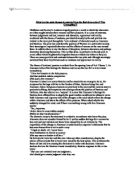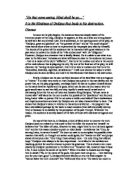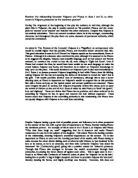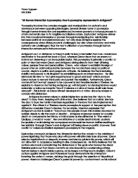"The Changeling" is a striking illustration of how the genius of a great dramatist can transform the most unpromising melodrama into the subject matter of a memorable and harrowing psychological tragedy.
THE CHANGELING: "...Beware of off'ring the first-fruits to sin..." "Women Beware Women"- Thomas Middleton "The Changeling" is a striking illustration of how the genius of a great dramatist can transform the most unpromising melodrama into the subject matter of a memorable and harrowing psychological tragedy. Una Ellis- Fermor, in "The Jacobean Drama: An Interpretation", describes the tragedy as the "most compact and pitiless in this drama", containing "elements of great beauty and subsequent action", resulting in their disintegration by the "spiritual evil set at work within them". Belonging to the decadent period of Jacobean tragedy, it is a key study in the history of post- Elizabethan drama- one that is psychological and realistic. It portrays a sombre and disturbing world, where driven by impulses and passions they can scarcely comprehend, leave alone master, Middleton's and Rowley's characters gradually disintegrate as moral beings. As T. S. Eliot has commented, it is the "tragedy of the not naturally bad but irresponsible and undeveloped nature, caught in the consequences of its own action." The play deals with complex ideas and feelings in such a way that the whole structure appears to rely on a sustained sureness and quickness of mind. It offers us a picture of the operation of folly and madness within the mind, and in doing so it explores 'abnormal' mental states;
The Irony and Puns in the Changeling Reveal the Characters actions are prompted by an Individual Sexual Drive though they are often unconscious of the fact .- How far do you agree with this Review?
"The Irony and Puns in the Changeling Reveal the Characters actions are prompted by an Individual Sexual Drive though they are often unconscious of the fact ."- How far do you agree with this Review? Throughout 'The Changeling' Middleton and Rowley create characters that are driven by calculated sexual desire. Having no outlet for their passion causes our protagonists to unconsciously shift their frustration in the direction which may, to be euphemistic, provide relief. There is a duplicity to much of the dialogue and the exchanges which take place within the play and many literal meanings have bawdy undertones conveying the subconscious preoccupations of the central characters. One area where individual sexual drive is evident is in the sphere of relationships where love and sexuality are often conflated. Alsemero speaks of love " as firm as love e'er built upon", the biological undertones of this reflect his attitude to Beatrice, as his love is founded upon a mere glimpse of her in the temple . Alsemero says "I love her beauties to the holy purpose" and this again is an affirmation of the physicality of his attraction to Beatrice. Beatrice's heightened awareness of this fact and the power of physical attraction is exemplified by her statement that eyes are "rash sometimes, and tell us wonders Of common things, which when our judgments find, They can then check the eyes,
What are the main themes to emerge from the first three acts of 'The Changeling'?
What are the main themes to emerge from the first three acts of 'The Changeling'? Middleton and Rowley's Jacobean tragedy portrays a world in which the characters are often caught between their reasons and their passions. It is a play of contrasts; between judgement and lust, measure and obsession, appearance and reality, combined with the theme of madness, provided obviously by the sub plot but also evident in the main plot through the 'love sickness' of characters such as Alsemero and Beatrice. The play also considers the position of Women in a patriarchal society, their stereotypical expected behaviour and the effects of women on the men around them. In addition there is also the theme of deception, between characters and perhaps characters deceiving themselves. This is often done, in particular in the sub-plot, to comic effect which heightens the tragedian themes evident else where in the play. There are many parallels and contrasts between the two plots and although seemingly unrelated they share key themes such as madness and appearance vs reality. The theme of irrational passion is evident from the opening lines of Act 1 Scene 1, As Alsemero talks of his feelings for Beatrice and we see the two fall in love almost immediately. "I love her beauties to the holy purpose, And that methinks admits comparison With man's first creation" Alsemero's intent is to marry
The Rover - How important is the carnival setting in influencing characters behaviour - especially that of the women?
The Rover Jessica Pemberton "How important is the carnival setting in influencing characters behaviour - especially that of the women?" Plan - Things to include Focus on the plays setting, e.g. social, historical and political Setting of the play in the 1650s Setting of the play in Naples, Italy Significance of the carnival - masks and disguise - deception How does it influence the character's behaviour The play's period setting in 1650's Italy is very significant as most restoration comedies are set in London. Behn may have set the play in Naples rather than England as the English were seen as "dull" and stingy, whereas Neapolitans are seen as a complete contrast and less restrained. The English restoration was an episode in the history of Britain beginning in 1660, when the English monarchy was restored under King Charles II after the interregnum that followed the English civil war. During his exile, Charles II had been a cavalier, roaming the continent with a band of royalist followers. When Charles II regained the throne after eighteen years of the Puritan government led by Oliver Cromwell and Cromwell's son, he restored the theater in London. During the time of Puritan rule, theaters had been burned down and stripped of their property, and those actors who dared to present informal dramas were publicly whipped for encouraging "immoral" behavior. Some theatres
It is the blindness of Oedipus that leads to his destruction. Discuss.
"He that came seeing, blind shall he go..." It is the blindness of Oedipus that leads to his destruction. Discuss As soon as the play begins, the audience becomes deeply aware of the immense power of the king, Oedipus: he appears, at first, as a wise and strong leader as well as a fair and shrewd ruler. He is addressed, in the opening scene of the play, as "Oedipus, great and glorious", as "the greatest of men" and as "the equal of gods" - these words alone show us how he is perceived by his people (and also by himself). The words of the priest tell the audience that he has acted with great wisdom in the past when he solved the riddle of the "vile enchantress" with his "diligence." However, Oedipus is a character that is fatally flawed. He is unable to see what is so clear to the blind seer Teiresias and what will become clear to the audience very soon - that he is cause of the city's "affliction", that he is the unclean one who is the source of the malevolence that is plaguing the city. By end of the final act of the play, he will discover, by 'having his eyes opened', that it is he who is unclean and that he is the "shameless, brainless, sightless, senseless sot." I will now discuss the ways in which Oedipus can be seen as blind, and how it is this blindness that leads to his destruction. Firstly, Oedipus can be seen as blind because of his fatal flaw that is arrogance
A Tale of Two Cities: Resurrection
A Tale of Two Cities: Resurrection It is Rig Veda who once said, "Life, death and rebirth are inevitable." Likewise, resurrection is an inevitable theme found throughout the plot of A Tale of Two Cities. Many of the characters in the novel are involved with the interlocking themes of love, redemption, and good versus evil. The theme of resurrection involves certain aspects of all of these themes and thus, brings the story together. The first of many to experience resurrection in A Tale of Two Cities is Dr. Manette. After being taken away from his pregnant wife, he is then imprisoned for eighteen devastating years. Over the course of these years, his sanity deteriorates to the point where he forgets his real name and mindlessly makes shoes to pass the time. In "Book the First", he is released by the French government and then put in the care of Monsieur Defarge. He is then suddenly "recalled to life" (19, 35). However, his rebirth has just begun and does not become complete until he is reunited with his daughter; Lucie Manette. In "Book the Second-the Golden Thread," the theme of resurrection begins to appear seldom as the book ends. At the start of this book, Charles Darnay, a young French noble of the Evrémonde family, is on trial for treason in England. He is accused of being a spy due to his time spent traveling back and forth between France and England. As
After the Lost War
After the Lost War Introduction The forty-four poems in After the Lost War by Andrew Hudgins are all spoken in the voice of the historical Georgia-born poet and musician Sidney Lanier. They are divided into four sections, ranging from chronicles of Lanier's Civil War experience to the personal aftermath of the war; from Lanier's state of mind during a time when his consumption threatened his life to the charting of the last days and thoughts of a man slowly dying of pulmonary tuberculosis. The poems follow a rough chronological order, and thematic leitmotifs unify the sections of the book. Each section is introduced by a short biographical paragraph, and in the preface Hudgins informs the reader that the voice of the poems will not be familiar to those who know the poetry and prose of the historical Lanier. Thus, the poems are unified by an empathetic, artistic impulse rather than a historical one. Poetically, Hudgins explores narrative, dramatic monologue, and voice, but thematically he is interested in questions of how a man of talent and sensitivity confronts a life of brutality. Analysis The brutal life of war is explored in "Burial Detail," in which Hudgins's Lanier tells of the grisly assignment of burying dead soldiers in a mass grave and scattering lime between layers of human flesh. At one point during the long night of burial detail, the soldier-poet faints
Remind yourself of Act III scenes ii and iii. What is the
Remind yourself of Act III scenes ii and iii. What is the importance of these two scenes in the context of the whole play in "tis pity she's a whore"? Both these scenes work together as a catalyst for the rest of the corruption in the play and therefore act as a crucial turning point. The importance is recognised in these features of the scenes and is especially seen in the plot and in the characters use of language. Scene ii opens with Florio's consent for Soranzo to talk with Anabella about marriage. This jovial atmosphere is then seen to descend into something more sinister and threatens the rest of the events in the play to a harsh end. Firstly, Anabella's use of sarcasm mocks Soranzo. Her response to his love sickness is belittled by her saying "why, I thought you had been sick!" And he now believes "'tis plain, she laughs at me." We have already been introduced to Soranzo as high in status and a person who stands up to others such as Grimaldi, so Ford's use of belittling Soranzo, especially by a woman creates great tension. This tension is then amplified by the sudden discovery of Anabella's pregnancy in scene iii. It is clear that her brother is the father, which furthermore implies a sense of great trouble to come, especially after just mocking Soranzo's love. Anabella's use of the dramatic word "o" emphasises this tension and the pace of the play also quickens to
Examine the relationship between Volpone and Mosca in Acts I and II of the Ben Jonson play "Volpone"; to what extent is Volpone presented as the dominant partner?
Examine the relationship between Volpone and Mosca in Acts I and II; to what extent is Volpone presented as the dominant partner? During The Argument at the beginning of the play the audience is told that, although the play's title is 'Volpone', the play is mostly centred on 'his parasite', Mosca, and the cross-plots he 'weaves' as he 'assures' and 'deludes' the other characters. Despite this, Volpone is not entirely submissive. There are several occasions where he is the stronger, commanding character, and throughout the play there are some elements of permanent authority, which cannot be overlooked. As stated in 'The Persons of the Comedy', Volpone is a 'Magnifico', an entrepreneur who would be socially higher than his parasite, Mosca, and therefore better educated than him. This good education is seen in Act II Scene ii as Volpone speaks as the mountebank, Scoto of Mantua. Although it is unknown who contrived the plot, although it is assumed to be Mosca as he suggests the disguise, Volpone uses scientific language, such as 'mal caduco' and 'hernia ventosa', to convince the crowd to buy his oil, even calling in 'Oglio del Scoto'. Even if Mosca had created the idea, he would have been unable to use such language to make the crowd believe Volpone was Scoto, and therefore he is reliant on Volpone's knowledge to help carry out his plans. This social dominance on Volpone's
All human interaction is powerplay. How is powerplay represented in Antigone?
"All human interaction is powerplay. How is powerplay represented in Antigone?" Powerplay involves the complex struggle and manipulation for authority and dominance between opposing ideologies. Several diverse forms of powerplay through human interaction are experienced, however power is a tortuous process to attain and retain due to its tangible and allusive nature. Sophocles' Antigone delves into this convoluted interplay of powers through investigating the relationship between political and personal power. Not only does Antigone explore the consequences when divine power is challenged, but also when state law and male authority are challenged. Thus the text's utilisation of powerplay through human interaction enhances its intricate nature. Antigone's act of defiance to Creon's edict is due to her belief that man-made laws are inferior to the unwritten laws of God, whereas Creon views that an enemy of state is not deserving of an honourable burial. This powerplay is primarily a conflict of point of view between Creon and Antigone arising directly from their differing values, perspectives and personalities. Creon, who values to establish his reign of power after an acrimonious battle between the two brothers vying for political control, depicts a politic and pragmatic attitude. He believes that he is restoring stability and peace to his kingdom by establishing such an












